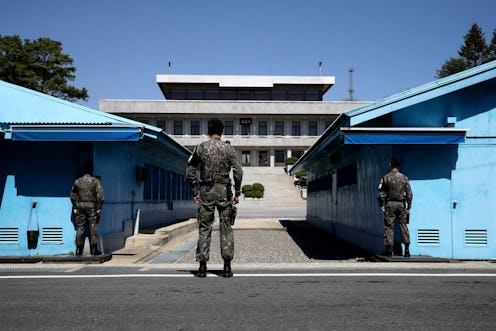News
Here's Exactly Why North Korea Is One Of The Most Repressive Countries On Earth

President Trump's highly-anticipated summit with North Korean leader Kim Jong Un is just around the corner, and it'll be the first time in history that an American and North Korean leader meet face-to-face. North Korea is a highly-secretive country, and so it's natural for outside observers to wonder: How does North Korea deal with opposition?
By making it illegal, that's how.
It's crucial to remember that North Korea isn't merely an authoritarian dictatorship. It's one of the most repressive authoritarian dictatorships on the planet, according to Human Rights Watch and other pro-freedom think tanks. As such, it's strictly illegal to to express any opposition to the North Korean government and its leaders — let alone form a bona fide opposition movement — inside the country's borders.
"Any political dissent or opposition is prohibited and harshly punished," Freedom House wrote in its 2018 report on North Korea. "The general public has no opportunity for political participation, and even KWP elites operate under the threat of extreme penalties for perceived dissent or disloyalty."
Sure, there are elections in North Korea, but they're just for show: In 2014, for instance, incumbent leader Kim Jong Un was "elected" to parliament with 100 percent of the vote, state-run media reported at the time. It's easy to get 100 percent of the vote, however, when no other candidates appear on the ballot, which is the case with North Korean "elections." Kim's predecessor, his father Kim Jong Il, was also elected with 100 percent of the vote in 2009.
North Korea's ban on speaking ill of the government is so sweeping that in 2016, the country's government banned sarcastic comments that could otherwise be interpreted as veiled criticisms of the ruling regime ("It's all America's fault," for instance, according to The Independent).
That's not to say that there isn't any opposition movement to the North Korean government. There is — it's just not located in North Korea. In 2016, several high-profile defectors from the country announced that the formation of a North Korean government-in-exile based in the United States and with some members in South Korea. That group met in March 2017 to craft a plan for overthrowing, or otherwise bringing about the downfall of, the Kim regime. Little has been reported about the organization since; whether that's because the effort has floundered or simply because its members wish to keep their activity secret is unclear.
The Trump-Kim summit — assuming it ultimately takes place — will be historic, but the two leaders took an unusual route to getting there. Trump has oscillated wildly in his public statements about Kim, referring to him derisively as "little rocket man" in one breath and then praising him as "very honorable" in the next. After announcing the summit, Trump abruptly canceled it — only to announce that it was back on schedule days later. North Korea, meanwhile, has gone from threatening to bomb the island of Guam, a U.S. territory, to stressing that its leaders are "willing to sit face to face, at any time and in any way," with Trump.
Although the details of the summit are of under wraps, the general points of contention between the two countries are not. Broadly speaking, American negotiators are expected to seek the complete denuclearization of North Korea, while North Korea will most likely ask for relief from American sanctions, an end to U.S. military exercises near the country's borders, and possibly the removal of American troops from South Korea.
Whether Trump and Kim can ultimately reach a deal is far from certain. However, a group of Republican lawmakers responded to the mere prospect of a deal by nominating Trump for a Nobel Peace Prize. When asked if he believes that he deserves to win one, Trump coyly replied that "everyone thinks so, but I would never say it."